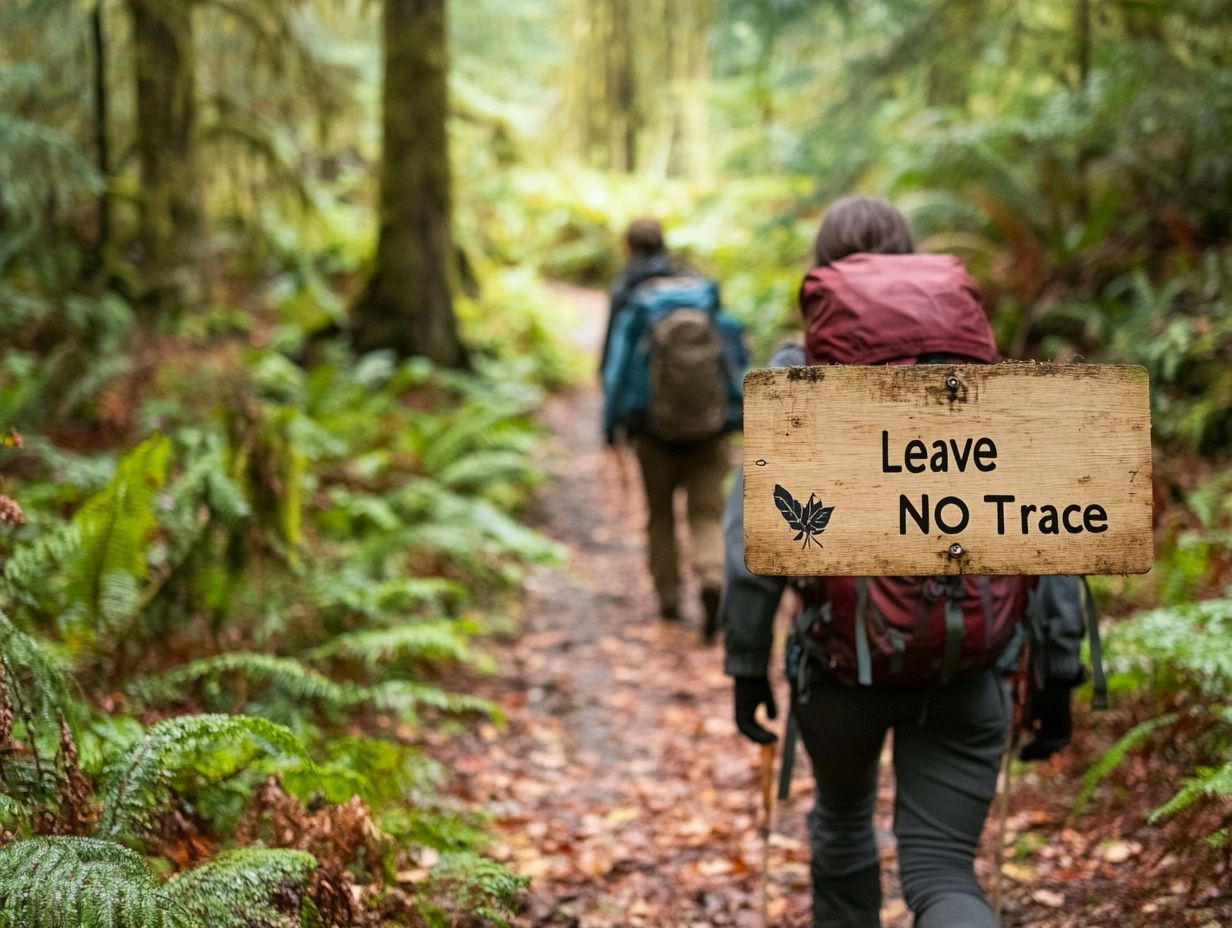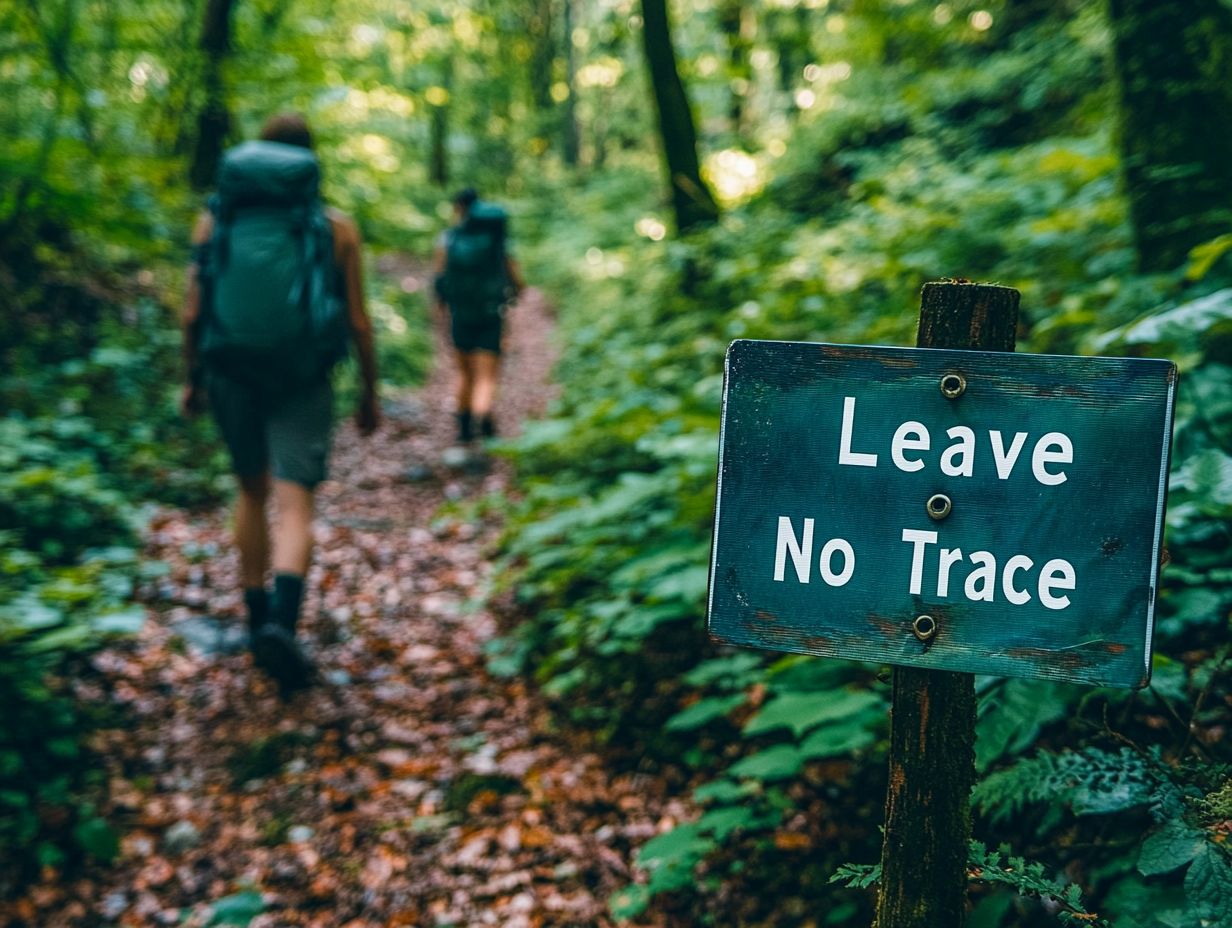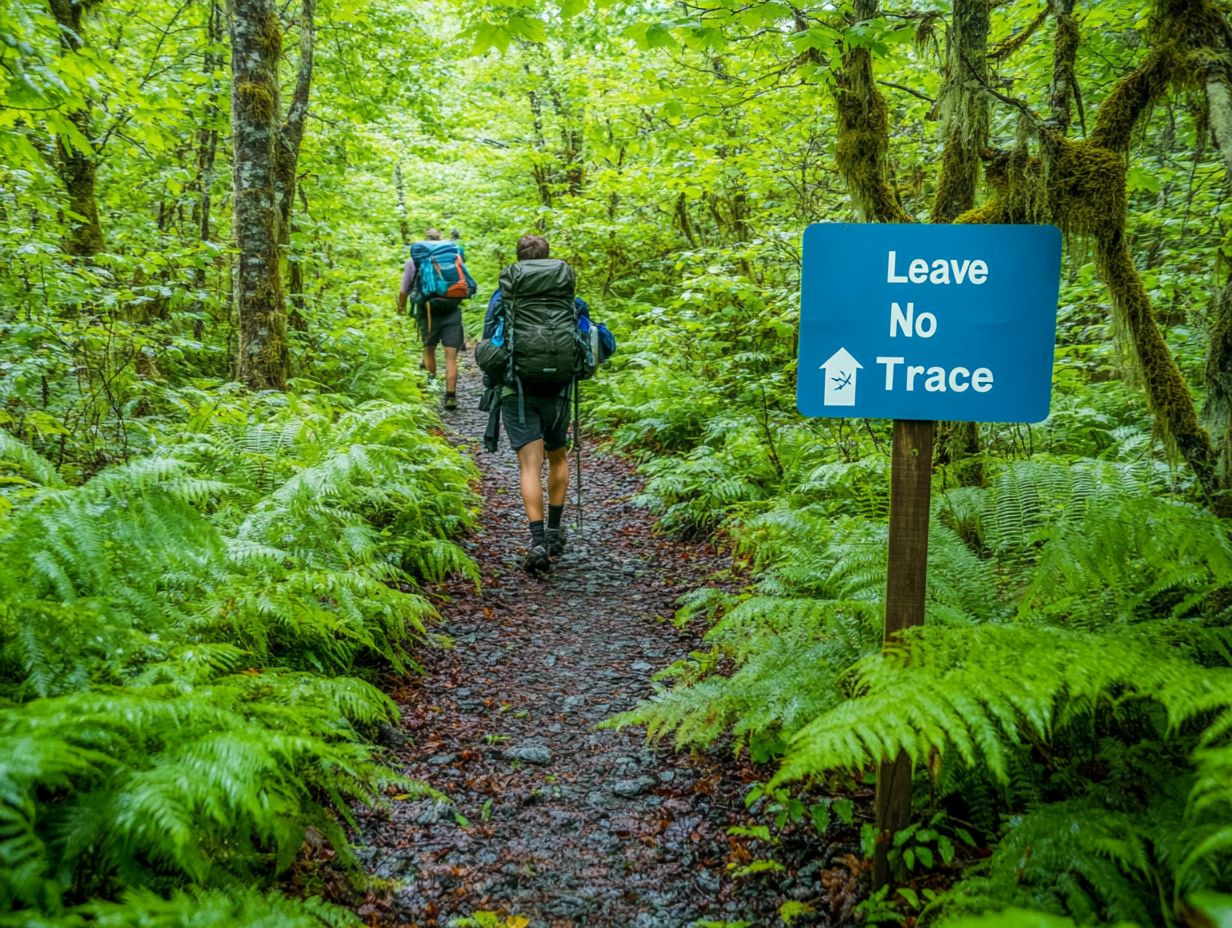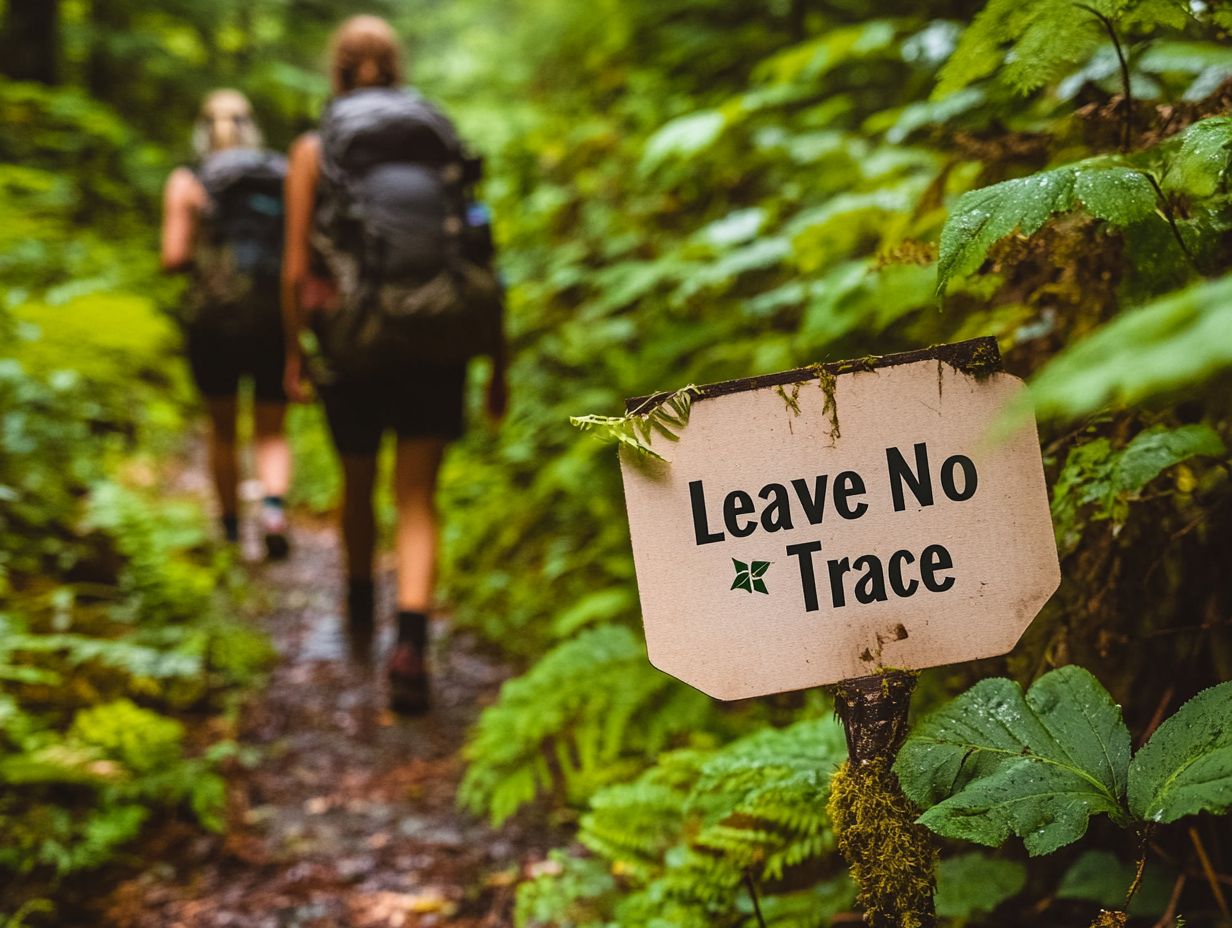The Importance of Leaving No Trace While Traveling
Traveling presents you with the incredible opportunity to explore breathtaking landscapes and connect deeply with nature. However, it also comes with the important responsibility of safeguarding these precious environments by following hiking principles.
The Leave No Trace principle encourages you to minimize your impact on the planet. This ensures that future generations can enjoy the same beauty you experience today.
This article will define Leave No Trace, delve into its significance for preserving ecosystems, and offer practical tips for sustainable travel, including planning ahead and following camping guidelines.
This article also addresses common challenges travelers face and suggests effective solutions.
Join us on this exciting journey! Discover how small changes can create a big impact on our planet!
Contents
- Key Takeaways:
- What Does Leave No Trace Mean for You?
- Why is Leave No Trace Important?
- How to Practice Leave No Trace While Traveling
- Benefits of Leave No Trace
- Challenges and Solutions
- Frequently Asked Questions
- Why is it important to leave no trace while traveling?
- How can leaving no trace benefit the local community?
- What are some examples of leaving no trace while camping?
- What are the seven principles of leaving no trace?
- What are the consequences of not following Leave No Trace principles?
- How can I spread awareness about the importance of leaving no trace while traveling?
Key Takeaways:

- Leaving no trace while traveling means minimizing our impact on the environment and preserving natural resources for future generations.
- Practicing Leave No Trace helps keep our planet sustainable. Your actions while traveling have lasting effects on the environment.
- By following guidelines and tips for Leave No Trace, we can reduce our personal impact while traveling and promote a more sustainable and eco-friendly global community through wildlife respect and effective waste disposal.
What Does Leave No Trace Mean for You?
Leave No Trace represents a refined approach to how to behave outdoors. It encourages responsible engagement with nature while minimizing your impact on the environment and embracing sustainable camping practices.
Originating from esteemed organizations like the US Forest Service, the National Park Service, and the Bureau of Land Management, the Leave No Trace principles underscore the significance of safeguarding ecosystems and preserving important places through conscientious behavior in national parks and wilderness areas.
Embracing these guidelines not only enhances your outdoor experience but also ensures that the beauty of the natural world remains intact for future generations.
Why is Leave No Trace Important?
Leave No Trace holds significant importance as it directly tackles the environmental impact of outdoor activities while championing sustainability for future generations. With the rising popularity of recreational pursuits, the risk of environmental degradation escalates.
It’s essential for you to embrace practices that safeguard delicate ecosystems and honor cultural heritage. This ensures that the natural world remains pristine for those who come after you by respecting local wildlife and following camping regulations.
Environmental Impact
The environmental impact of outdoor activities can be considerable if you don t follow proper guidelines. This can lead to issues like soil erosion, habitat destruction, and pollution, which can be mitigated by adhering to Leave No Trace principles.
Take popular national parks, for example. If you overlook Leave No Trace principles, you might inadvertently contribute to trail widening, where new paths form, disturbing the surrounding vegetation and wildlife habitats.
Improper waste management, such as leaving trash or human waste behind in these pristine areas, poses serious risks to local ecosystems. This attracts wildlife and contaminates water sources, so effective waste disposal is crucial.
Opting for durable surfaces for trails and camping areas helps to minimize these impacts. Educational resources about respecting nature’s balance can enable you to safeguard these invaluable environments and support nature conservation efforts.
By showcasing real-life examples of environmental degradation, it becomes clear just how urgent it is to adhere to established guidelines, including trail etiquette and proper food storage.
Sustainability and Preservation

Sustainability and preservation sit at the heart of the Leave No Trace philosophy, dedicated to safeguarding the natural world for future generations while encouraging responsible outdoor recreation.
By embracing principles like proper food storage and minimizing the impact of campfires, you can play a crucial role in conserving delicate ecosystems. Keeping your food securely stored not only deters wildlife encounters but also helps prevent pollution in pristine areas.
Using established fire rings or portable stoves helps minimize campfire effects and maintains the integrity of the surrounding environment.
Striking a balance between enjoying outdoor activities and being responsible fosters a sustainable relationship with nature. This allows you to enjoy its beauty while ensuring it remains preserved for future generations, particularly through responsible hiking and effective planning.
How to Practice Leave No Trace While Traveling
By embracing Leave No Trace principles, you re not just hiking; you re making a real difference in environmental stewardship and respecting local ecosystems.
Adhering to these essential guidelines minimizes your impact on the natural world and champions outdoor ethics that resonate with responsible adventurers.
Guidelines and Tips
To truly embrace the Leave No Trace ethos, follow specific guidelines and tips that promote environmentally friendly behaviors while camping and consider trail conditions and group size.
By ensuring proper waste disposal like packing out all trash and utilizing designated toilet facilities or digging a cat hole (a small hole dug in the ground for waste disposal) at least 200 feet from water sources you contribute to keeping natural spaces pristine and safeguarding fragile ecosystems.
Opting for biodegradable soap when washing dishes or bathing minimizes chemical impact on river ecosystems, ensuring your outdoor adventures don t compromise nature and support healthier wildlife populations.
Respecting local wildlife is crucial. Observe animals from a distance rather than feeding them, which helps prevent unwanted interactions between people and wildlife and promotes wildlife observation in natural habitats.
Sticking to camping regulations, such as camping only in designated areas, enhances your experience and protects sensitive habitats. For example, when you stay on marked trails, you help preserve plant life and minimize soil erosion, contributing to the overall health of the environment.
Benefits of Leave No Trace
Embracing Leave No Trace principles offers advantages that extend far beyond your personal outdoor adventures. It cultivates a shared commitment to environmental stewardship and responsible recreation, enhancing everyone’s experience in the great outdoors.
Personal and Global Impacts

Practicing Leave No Trace has profound personal and global impacts. It shapes your behaviors while contributing to broader efforts in nature conservation, which entails protecting habitats and supporting biodiversity, as well as promoting camping etiquette and outdoor education.
When you embrace these principles, you not only elevate your own outdoor experiences cultivating a deeper connection with nature but also actively participate in protecting fragile ecosystems. Research indicates that 75% of U.S. park visitors engage in some form of responsible outdoor behavior, leading to a nearly 30% decrease in waste and litter on public lands over the past decade. Such collective action fosters cleaner rivers and healthier wildlife populations.
By choosing to follow these practices, you invest in your enjoyment while becoming a champion for a sustainable future. Your actions matter join the movement for a cleaner planet!
Challenges and Solutions
Despite the significance of Leave No Trace, you may encounter several challenges when trying to implement these principles effectively, especially in group camping settings. It’s essential to explore innovative solutions to address these hurdles and mitigate any potential environmental damage. This includes creating educational materials and outdoor education programs.
Overcoming Obstacles to Leave No Trace
To practice Leave No Trace effectively, you need a clear plan that includes targeted outdoor education, effective waste disposal methods, and nurturing responsible behaviors among group camping participants.
By implementing educational workshops focused on camping etiquette, you ll equip campers with the essential knowledge to respect shared spaces and minimize their environmental impact while reinforcing awareness of Leave No Trace principles.
Integrating hands-on activities, like proper waste disposal demonstrations, encourages habits that stick.
One standout initiative is the ‘Leave No Trace Trainer’ program, which has successfully instructed diverse groups on best practices. This has led to marked improvements in adherence to these vital principles.
Forming partnerships with local youth organizations can pave the way for community-driven clean-up events, reinforcing the importance of stewardship and cultivating a respectful culture among campers through outdoor education initiatives.
Frequently Asked Questions
Why is it important to leave no trace while traveling?

Leaving no trace while traveling helps minimize our impact on the environment and preserves natural beauty for future generations to enjoy.
How can leaving no trace benefit the local community?
Practicing Leave No Trace principles reduces our impact on the local community and shows respect for their culture and way of life.
What are some examples of leaving no trace while camping?
Examples include properly disposing of waste, using designated campsites, and minimizing campfire impact.
What are the seven principles of leaving no trace?
The seven principles include: plan ahead and prepare, travel and camp on durable surfaces, dispose of waste properly, leave what you find, minimize campfire impacts, respect wildlife, and be considerate of other visitors.
What are the consequences of not following Leave No Trace principles?
Not following Leave No Trace principles can damage the environment, harm wildlife, and disrupt local communities. It can also lead to fines or penalties for violating camping regulations and outdoor ethics.
How can I spread awareness about the importance of leaving no trace while traveling?
Take action now! Set a good example, participate in clean-up efforts, and share educational materials about Leave No Trace principles with others, focusing on responsible hikers and outdoor education.
Join a local cleanup event today!






